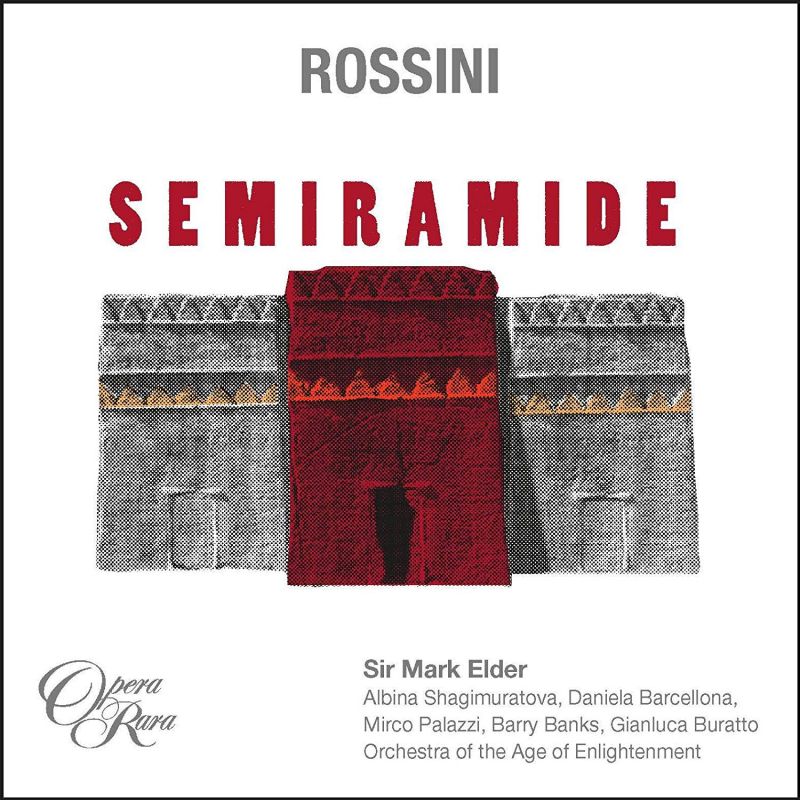ROSSINI Semiramide (Elder)
View record and artist detailsRecord and Artist Details
Composer or Director: Gioachino Rossini
Genre:
Opera
Label: Opera Rara
Magazine Review Date: AW18
Media Format: CD or Download
Media Runtime: 0
Mastering:
DDD
Catalogue Number: ORC57

Tracks:
| Composition | Artist Credit |
|---|---|
| Semiramide |
Gioachino Rossini, Composer
Albina Shagimuratova, Semiramide, Soprano Barry Banks, Idreno, Tenor Daniela Barcellona, Arsace, Mezzo soprano David Butt Philip, Mitrane, Tenor Gianluca Buratto, Oroe, Bass Gioachino Rossini, Composer James Platt, L'Ombra di Nino, Bass Mark Elder, Conductor Mirco Palazzi, Assur, Bass Opera Rara Chorus Orchestra of the Age of Enlightenment Susana Gaspar, Azema, Soprano |
Author: Richard Osborne
Beguiled though we were by the somewhat abbreviated 1966 Decca recording featuring Joan Sutherland and the young Marilyn Horne, it was not until the publication of Philip Gossett’s new Critical Edition in 1990 that we realised how grand an experience a complete Semiramide can be. New York’s Metropolitan Opera saluted the edition with a powerful new staging (ArtHaus Musik, A/02 – nla) featuring June Anderson, Marilyn Horne and Samuel Ramey, a famous Assur; but with the complete opera occupying a full five hours in the theatre, this too had to be to cut.
Deutsche Grammophon made the first complete recording in 1992. Plausibly and powerfully cast, it ought to have worked but didn’t, due largely to Ion Marin’s reckless conducting. Twenty years later Naxos recorded it, live and complete, at the Rossini in Wildbad Festival; but this, too, proved unsatisfactory, upended by a vocally challenged Semiramide and some stand-and-stare (as opposed to boy racer) conducting.
All this talk of conductors might seem odd given that with Semiramide ears are invariably turned to the voices. So let it be said that the new Semiramide, the lavishly gifted Russian coloratura Albina Shagimuratova, she of the shining high E, and Daniela Barcellona, our finest contemporary Arsace, are both superb. ‘Serbami ognor’ is sublime but go to ‘Ebbene, a te, ferisci’, Semiramide’s echo of the closet scene in Hamlet and as difficult a duet as any in Italian opera, and you will realise just how good they really are.
That said, not the least of the revolutions Rossini’s late operas unleashed on the world was the need for a fully functioning conductor. Not many Semiramide conductors have made successful traversals of Wagner’s Ring but Mark Elder has, and it shows. At points of crisis such as the apocalyptic first finale, this is an intensely theatrical performance, yet there is no rush in the larger shaping of the piece. The classic marriage of exact rhythms, a firm pulse and the speaking beauty of the vocal overlays makes for a continuously expressive unfolding of the musical narrative.
Then there is the orchestra. Though Elder had blazed a trail by using the period-instrument Orchestra of the Age of Enlightenment for his thrilling 1992 London concert performance of Rossini’s Ermione, elsewhere modern singers and old instruments continued to unhorse one another in post-1800 repertory. Not here.
And what a difference the old instruments make. It will be difficult to hear Semiramide again without the melancholy beauty of the period horns and bassoons, the hieratic splendour of the brass, the distinctive timbres of the solo winds, clear as a May morning, or the rasp and sinister atmospheric charge of the lower strings.
Elder’s presence is also a boon to the young Italian bass Mirco Palazzi, a late substitution in the role of Assur. If Palazzi finesses the odd moment of largely redundant coloratura, the role’s dramatic essences are strongly distilled, not least the pivotal Act 2 duet, where Assur and Semiramide row like the Macbeths, and Assur’s great mad scene, where Elder’s torrential conducting helps add cubits to the performance’s stature. It speaks volumes that in Assur’s delirious ‘Deh! ti ferma’, a Rigoletto-like lament, lofty yet freighted with despair, even Marin’s Samuel Ramey is outscored. The vocally resplendent Italian bass Gianluca Buratto is an imposing High Priest and Barry Banks gives a typically well-crafted reading of the stratospherically high role of the hapless Indian king Idreno, both his arias happily intact.
At the end, it’s the old king’s ghost, not Oroe, who orders the killing of Assur, an imaginative take on a change Rossini might have made for Paris in 1825. There were other changes in Paris in an attempt to improve the opera’s problematic end. But only text survives, no music, alas.
In the 1966 Bonynge recording, the state entrance of Idreno and his entourage in Act 1 is cut to shreds and the onstage banda parts (unknown at the time) are missing. Helped by first-rate choral work, how splendid that all now sounds, the whole thing magnificently preserved in the acoustically superb recording Steve Portnoi and producer Jeremy Hayes have conjured up for us. It’s a bespoke studio recording, of course; expensive to produce but, my goodness, what a difference that makes.
Discover the world's largest classical music catalogue with Presto Music.

Gramophone Digital Club
- Digital Edition
- Digital Archive
- Reviews Database
- Full website access
From £8.75 / month
Subscribe
Gramophone Full Club
- Print Edition
- Digital Edition
- Digital Archive
- Reviews Database
- Full website access
From £11.00 / month
Subscribe
If you are a library, university or other organisation that would be interested in an institutional subscription to Gramophone please click here for further information.




